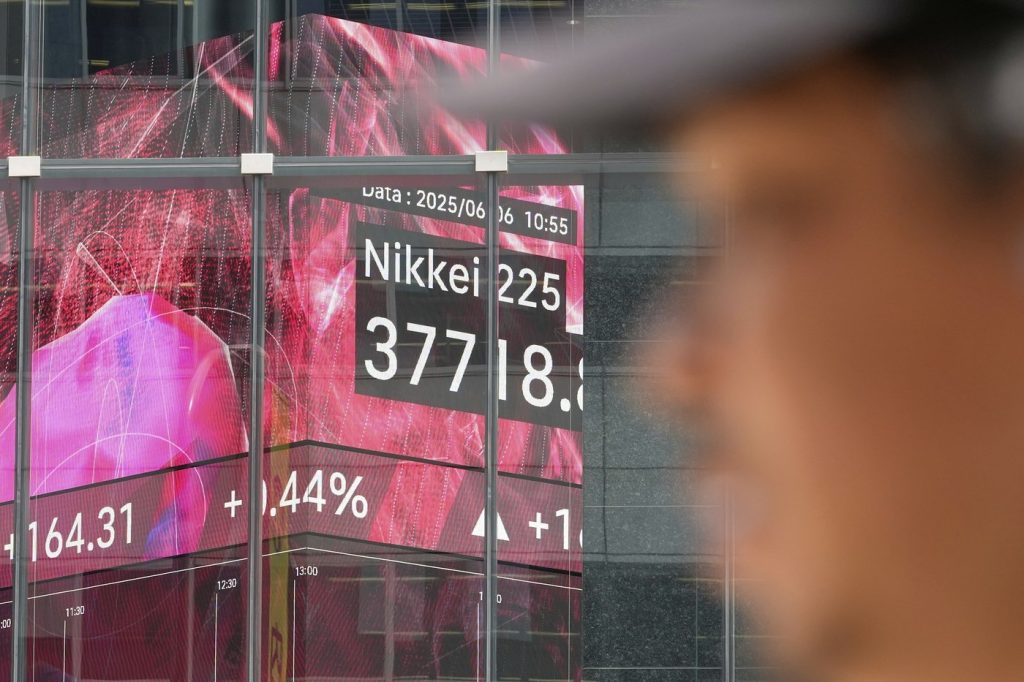Shares in Asia witnessed an upswing on Monday ahead of the anticipated second round of trade talks between Washington and Beijing, scheduled to take place later in London. Notably, Tokyo's Nikkei 225 index advanced by 1.1% to reach 38,137.09, despite the Japanese government reporting a contraction of 0.2% in the economy for the January-March quarter.
In South Korea, the Kospi index experienced a robust increase of 1.9%, climbing to 2,865.52. Chinese markets also showed positive momentum, even in light of reports indicating a slowdown in exports for May, with growth recorded at 4.8% year-on-year after surpassing 8% in April. Outbound shipments to the United States dropped nearly 10% compared to the previous year. Additionally, China disclosed a 0.1% decline in consumer prices for May, marking the fourth consecutive month of deflation.
The Hang Seng Index in Hong Kong rose by 1.4% to settle at 24,119.64, whereas the Shanghai Composite Index edged up by 0.4% to 3,397.13. It is important to note that Australia's market was closed for a public holiday.
On the preceding Friday, U.S. stocks gained traction following a better-than-expected report on the job market. The S&P 500 witnessed an uptick of 1% to reach 6,000.36, while the Dow Jones Industrial Average also added 1%, closing at 42,762.87. The Nasdaq soared by 1.2%, settling at 19,529.95. All sectors within the S&P 500 experienced positive performance, highlighting a second consecutive week of gains for the benchmark index, which has rebounded from a slump two months prior and is now nearing its record high.
Technology stocks played a significant role in the broader gains, with chipmaker Nvidia rising by 1.2% and iPhone manufacturer Apple increasing by 1.6%. Additionally, Tesla's stock surged by 3.7%, recovering some of the significant losses it incurred the previous Thursday amid a heated social media exchange involving President Donald Trump and CEO Elon Musk.
Notably, Circle Internet Group, a prominent U.S.-based cryptocurrency issuer, saw its stock skyrocket by 29.4%, building on its impressive 168% gain from its debut on the New York Stock Exchange on Thursday. Although U.S. employers slowed hiring last month, they added a robust 139,000 jobs, demonstrating resilience within the job market despite ongoing uncertainties stemming from Trump’s trade war.
Companies across a spectrum of industries have expressed apprehensions regarding the potential revenue and profit impacts of tariffs, with Lululemon Athletica suffering a 19.8% decline after cutting profit expectations due to tariff-related challenges and competition from emerging brands. This reflects a broader industry trend, as various companies, from retail to airlines, are warning investors about potential financial repercussions from rising costs linked to tariffs.
The anticipation of potential tariff reductions by Trump following trade agreements with various countries has been a significant factor driving the recent rally in the S&P 500, which dropped approximately 20% two months ago from an all-time high. The economic landscape is further influenced by tariffs affecting a wide range of goods from key trading partners and raw materials like steel, with the potential for heavier tariffs impacting businesses and consumers in the forthcoming months.
Recent reports indicate that the U.S. economy contracted during the first quarter. Surveys conducted by the Institute for Supply Management indicated a contraction in both American manufacturing and services in the previous month. According to the Organization for Economic Cooperation and Development, a forecast for the U.S. economy suggests a growth rate of 1.6% for this year, a decline from the 2.8% growth rate of the previous year.
Financial markets are reacting to increasing uncertainty regarding tariffs and their wider economic implications, placing the Federal Reserve in a challenging position as it assesses appropriate monetary policies in light of these factors.
In other trading activity early on Monday, U.S. benchmark crude oil prices dipped by 3 cents to $64.55 per barrel, while Brent crude, the international standard, fell by 5 cents to $66.42 per barrel. Additionally, the U.S. dollar weakened against the Japanese yen, dropping to 144.42 yen from 144.85 yen, and the euro edged up slightly to $1.1422 from $1.1399.










